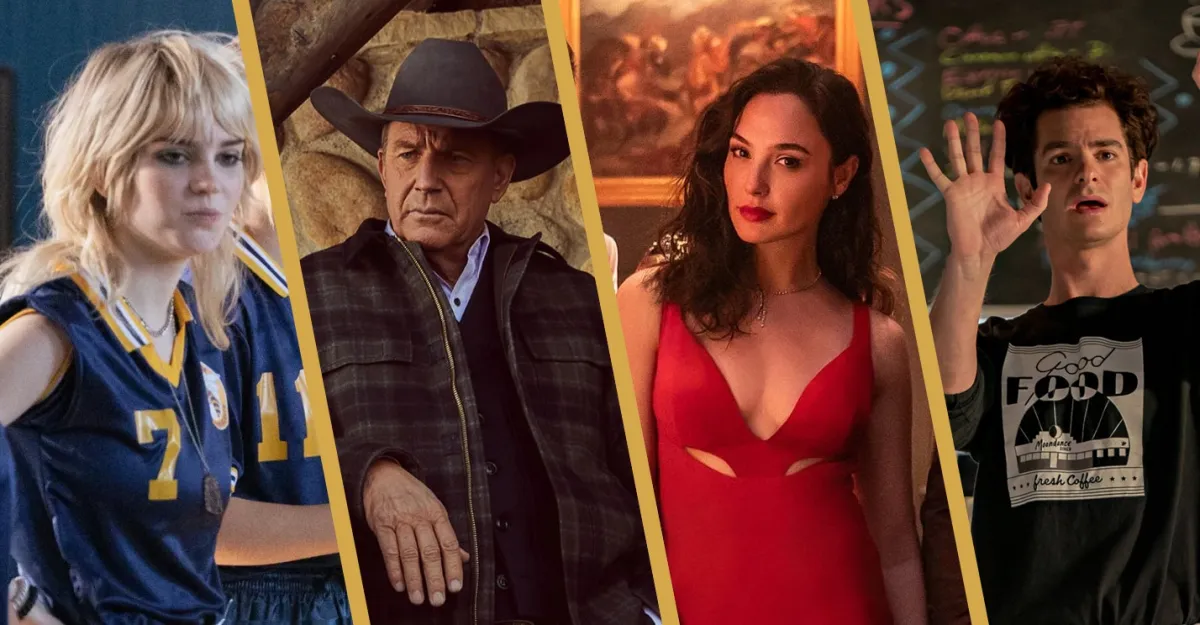There may or may not be an ancient Chinese curse, “May you live in interesting times.” The past two years have certainly been interesting. One of the least important aspects of those times, but an interesting element nonetheless, has been a sense of increased fracturing of the monoculture. The past year has seen something of a disconnect between the most popular culture and the most discussed culture.
Shows like Succession and Yellowjackets have dominated online discourse, but it seems like they have had minimal impact on the culture at large. In contrast, the year’s most popular culture has been among its least discussed. Yellowstone is the most popular show on cable, but it garners remarkably little coverage. Red Notice has apparently become Netflix’s most watched original movie ever, with the studio greenlighting two sequels, but it landed with a dull thud in online conversation.
To be fair, this is nothing new. From the earliest days of the modern internet, the relative popularity of a television show hasn’t always been proportionate to its share of online discourse. Shows with impressively large audiences like CSI, NCIS, and Criminal Minds never quite generated the intensity of web chatter that (comparatively) niche shows with smaller audiences like Game of Thrones garnered on an almost weekly basis.
Similarly, Netflix’s most successful projects have rarely been its buzziest. Critics raved and dissected movies like The Irishman or Roma. However, even pre-Red Notice, the studio’s list of its most successful movies was topped by the Chris Hemsworth action vehicle Extraction. There is, of course, reason to be skeptical of self-reported metrics from streaming companies, but there is no reason why Netflix would lie about this.

However, this gulf between the media that attracts audiences and the media that generates online conversation seems much more pronounced in the pandemic era. The past few decades have seen media pundits growing increasingly anxious about the idea that individuals are trapped within “bubbles” that distort reality, and these fears have only been accelerated by a pandemic that has (for obvious and logical reasons) cut down on the opportunities for shared communal activity.
It is tempting to read this as the culmination of a larger trend. After all, critics and pundits have spent years lamenting the perceived “death of the monoculture,” suggesting that the end of television shows like Game of Thrones, the culmination of the Marvel Cinematic Universe, or even the death of icons like Michael Jackson represented the end of a shared experience of mass media. Of course, history suggests that reports of the monoculture’s death have been greatly exaggerated.
This hasn’t stopped the handwringing on the subject. It seems like the past few years have seen increased traction around debates over whether critics are out of touch with regular audiences. Pundits frequently point to divergences between critical opinion and online audience scores, ignoring the reality that online audience scores are self-selecting and easily gameable metrics. These sorts of divides often exist more in the mind of the beholder than in any actual reality.
Again, this perceived divide has drawn even more attention over the past couple of years. This awards season, the critical antipathy towards Adam McKay’s Don’t Look Up has provoked outrage from fans who insist that those “sneering critics” must be out of touch. Yair Rosenberg penned a passionate piece at The Atlantic insisting that critics were out of touch with audiences by writing off beloved pieces of popular culture like Hamilton and Harry Potter and that critics needed to reconnect.

This is self-evidently nonsense. All of the original Harry Potter films earned positive reviews on Rotten Tomatoes. The only film in the franchise to earn negative reviews, the spin-off Fantastic Beasts: The Crimes of Grindelwald, was also the brand’s first box office disappointment, suggesting audiences and critics are not too far apart. This year’s 20th anniversary special received an overwhelmingly (96% RT) positive critical reception, even allowing for controversy around the author.
Similarly, Disney+’s release of a stage recording of Hamilton in 2020 was met with considerable critical enthusiasm. Even allowing for the two years that have passed since, the insinuations that critics are targeting Lin-Manuel Miranda are easily disproved by looking at the critical reception to recent projects involving the talented singer-songwriter: In the Heights, tick, tick… BOOM!, and even Encanto. Critics seem to align with audiences in these cases.
It often seems like these allegations that critics are “out of touch” or “disconnected” lie in the assumption that any criticism of any popular thing is out of bounds, even if it is a dissenting opinion or even if it exists in the context of broader praise. It’s an argument that seems to misunderstand the function of criticism. Miranda himself is more gracious in dealing with such criticism than commenters like Rosenberg, conceding that certain criticisms of his earlier work are “fair game.”

Perhaps this misunderstanding of the role and function of criticism explains the gulf between the content that audiences are watching and the entertainment that generates discussion. Critics will often review based on audience taste, with what audiences want to see garnering coverage. However, when it comes to feature coverage and online discussion, critics respond to these works in their own ways.
For a lot of critics, there is simply more to write about in Yellowjackets than Yellowstone, more that merits discussion in The Irishman than Extraction. This is not a value judgment. Yellowstone and Extraction certainly appear to have satisfied their target audiences. It’s also not elitist, as much of the pop culture that has garnered intense online coverage includes reality television like Tiger King, dating shows like Love Is Blind, and raunchy bodice rippers like Bridgerton.
It seems inevitable that there will be more monoculture. There will be another show that occupies the popular imagination like Game of Thrones did, just as Game of Thrones occupied the popular imagination like Lost did. It probably won’t look like Game of Thrones, and audiences won’t realize that it has dominated the monoculture until it has. Popular culture just feels so divided and fractured right now because there’s a temporary vacuum.

Audiences aren’t living through the death of the monoculture so much as a dearth of the monoculture. Blockbusters and event movies have often served as poles around which pop culture can align itself, seismic events that bring everything into focus. During the pandemic, there have been extended lulls between major releases, owing to challenges with production and questions about the viability of release strategies. As such, these ordering events are distanced themselves.
In the almost three months between the releases of Spider-Man: No Way Home and The Batman, there are only really two major theatrical films: Scream and Moonfall. Scream has performed well at the box office, but this is largely as a result of a complete lack of competition. This gulf in content explains why so much of the mundanity around The Batman has become headline news, like the age rating or the runtime. These non-stories become stories because there is nothing else to talk about.
In its own way, this is reassuring. It suggests that audiences still want a monoculture, that they still yearn for a shared and collective experience that only this sort of popular culture can provide. Critics and audiences are not as divided as they might seem right now; they just lack common material to discuss. The monoculture isn’t dead; it’s just resting. It may be too soon to assert when normal service will resume, but it seems more certain than ever that it will.






Published: Jan 22, 2022 11:00 am